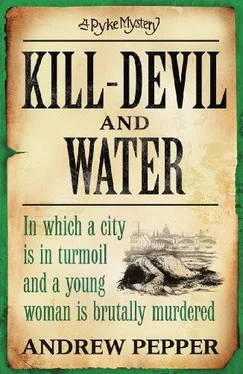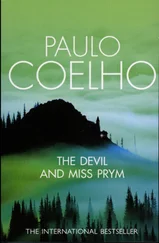Andrew Pepper - Kill-Devil and Water
Здесь есть возможность читать онлайн «Andrew Pepper - Kill-Devil and Water» весь текст электронной книги совершенно бесплатно (целиком полную версию без сокращений). В некоторых случаях можно слушать аудио, скачать через торрент в формате fb2 и присутствует краткое содержание. Жанр: Исторический детектив, на английском языке. Описание произведения, (предисловие) а так же отзывы посетителей доступны на портале библиотеки ЛибКат.
- Название:Kill-Devil and Water
- Автор:
- Жанр:
- Год:неизвестен
- ISBN:нет данных
- Рейтинг книги:3 / 5. Голосов: 1
-
Избранное:Добавить в избранное
- Отзывы:
-
Ваша оценка:
- 60
- 1
- 2
- 3
- 4
- 5
Kill-Devil and Water: краткое содержание, описание и аннотация
Предлагаем к чтению аннотацию, описание, краткое содержание или предисловие (зависит от того, что написал сам автор книги «Kill-Devil and Water»). Если вы не нашли необходимую информацию о книге — напишите в комментариях, мы постараемся отыскать её.
Kill-Devil and Water — читать онлайн бесплатно полную книгу (весь текст) целиком
Ниже представлен текст книги, разбитый по страницам. Система сохранения места последней прочитанной страницы, позволяет с удобством читать онлайн бесплатно книгу «Kill-Devil and Water», без необходимости каждый раз заново искать на чём Вы остановились. Поставьте закладку, и сможете в любой момент перейти на страницу, на которой закончили чтение.
Интервал:
Закладка:
‘You did your best, sir,’ one of the turnkeys muttered. ‘The good Lord will judge him for what he did.’
Pyke lowered his head and followed Tilling and their guide back along the passage and down the stone steps into the yard. They walked through the yard in silence and passed through the two gates. The turnkey there acknowledged them with a curt nod and muttered, ‘Goodnight, sir.’ Pyke glanced across at the steps leading up to the chapel, where Morel-Roux would stage his dramatic, last-minute act in the morning, but he would have to find another way to get back there. If he wasn’t seen leaving the prison, his absence would be noted and the alarm raised. It didn’t matter that he was a policeman, in their eyes at least. They passed through one gate, followed the passage as far as the other gate, and waited while their guide banged on the door. A few stone steps took them back up into the lodge, where the turnkey gave them an awkward nod and asked whether they needed any assistance. When Tilling told him they would be fine, he disappeared back down the steps into the bowels of the prison. The gatekeeper unlocked the door that opened on to Old Bailey. Knowing that this was his last chance, Pyke told Tilling he’d left his stick in the office in the governor’s house and that he’d meet him outside. The gatekeeper didn’t seem overly concerned by this, and didn’t try to accompany Pyke back along the passage to the room with the book. Alone, Pyke took a breath and tried another door leading off this room. To his relief it wasn’t locked. He stepped into what he supposed was part of the governor’s house, shut the door behind him and waited. If the gatekeeper didn’t double-check that Pyke had left, he would be all right. He was at one end of a dark, gloomy passage which he followed to a door at the other end. Making as little noise as possible, he opened the door and stepped into the hallway. He could hear voices coming from one of the rooms as he tiptoed across the polished floor in the opposite direction, towards the staircase, which he mounted two steps at a time. Dripping with sweat, he paused briefly at the top of the stairs, listening for any further voices. When all appeared to be silent, he let himself into what turned out to be an unoccupied guest bedroom. He closed the door behind him and sat down on the edge of the bed. It was about eight in the evening and already people would be starting to gather outside the prison in anticipation of the hanging. He had the rest of the night to try to find his way back into the chapel.
It took Pyke a while to get his bearings. The small, grated window, although locked, had a view of Newgate Street. He knew that the chapel, and also the press yard, backed on to Newgate Street, just as he knew, or had read, that the governor’s house had no windows at the front and no views over the interior of the prison. All this meant that if he went to the very top of the governor’s house and found the main chimney flume he might be able to clamber up inside it and find a way on to the roof.
He found the flume in what seemed to be an unused nursery and peered up into the darkness. Perhaps a young boy might have been able to clamber up there but Pyke quickly ruled it out for himself. In the other rooms, he inspected the ceiling for a hatch leading up into the attic, if indeed the building had one. After ten or so minutes, he found what he was looking for in one of the servant’s rooms and, standing on the bed, managed to pull himself up through the space. Once in the attic, he slid the hatch back into place and waited for his eyes to adjust to the darkness. There would have to be some kind of light-well or opening on to the roof. He moved carefully across the wooden beams and looked out into the cavernous space. Ahead he could see a patch of light and a few minutes later he was standing on the roof, staring out across the city — Westminster Abbey in one direction, St Paul’s gargantuan dome in the other.
The roof was flat and he was able to cross it with ease and look down into the Debtors’ Quadrangle beside the yard he’d walked through earlier with Tilling. There was a drop of about twenty feet on to the roof of the chapel. He lowered himself off the roof as far as he was able and jumped, landing awkwardly but without turning his ankle. Standing up, Pyke hurried over to the edge of the roof and looked down into the garden of the Royal College of Physicians, which bordered the prison. The drop was somewhere between fifty and a hundred feet. Having removed the rope from around his shoulder, he tied one end of it around a stone balustrade and let the rest of it fall down the side of the chapel as near to one of the windows as possible. Then he took the stovepipe hat, removed his swallow-tailed coat and threw both items into the garden, where he could pick them up later. More comfortable in just trousers and a shirt, he rubbed his palms dry, made sure the knife and jemmy were within reach and took the rope in his hand. Carefully he lowered himself over the edge of the roof, gripped the rope with his hands, threaded it through his ankles and shimmied down it as far as the window, which was still a drop of seventy or so yards from the ground. Clasping the rope with one hand and threading it around his feet to take his weight, he jemmied the window open and manoeuvred himself into the gap. There, Pyke gathered in the rest of the rope and let it drop down inside the building. A minute later, he was again standing on solid ground, alone in the eerie solitude of the chapel.
His pocket watch said that it was only midnight but it felt later. About that time, he mused, a wagon would pull out of the prison’s main gate and come to a halt by the black-painted door on Old Bailey. There, trained workers would take the poles and boarding and begin the task of assembling the scaffold. Meanwhile, wooden barriers would be erected around the perimeter of the scaffold to prevent the crowds from getting too close. With more than eight hours to go before the execution, much of Old Bailey would already be filled with people eager to secure a good spot to witness the spectacle, and the taverns, ginneries and beer shops in the immediate vicinity would be heaving with customers. And since the murder and the trial had attracted so much attention — an aristocrat had been killed by his servant, after all, or so people had been led to believe — the crowd would be particularly sizeable. Some might even want to cheer Morel-Roux for what he was alleged to have done.
Pyke wandered over to the condemned pew, a huge black pen, where he had sat bound and silent ten years earlier. Then, he’d been accused of murdering his mistress, but just like the valet he had held his tongue, refusing to participate in the charade and offering no confession to the ordinary.
Little had changed in the intervening years and the chapel remained a desolate place, even more so now it was silent and deserted. The bare pulpit, the sturdy altar table and the unpainted benches all stood in stark contrast to the plush appointments of many modern churches. Prisoners awaiting execution had, at one time, been forced to look down at their own coffins but such a practice had been stopped because some felt it too barbaric. Pyke had often wondered about this logic; for wasn’t it also barbaric to execute people in public? Or to execute anyone at all?
A little later, he lay down on one of the hard, wooden benches and closed his eyes.
He woke about five, though in truth he hadn’t really slept, at least not the kind of deep, satisfying sleep he was used to. The air was cool and stale in the chapel and it still felt eerily quiet, even though the crowds outside the prison would now be backing up the slope towards Snow Hill and Smithfield. They would be boisterous, too, as crowds always were on such days. Boisterous, vast and sprawling. Pyke estimated, there would be forty or fifty thousand people crammed into Old Bailey and the surrounding streets.
Читать дальшеИнтервал:
Закладка:
Похожие книги на «Kill-Devil and Water»
Представляем Вашему вниманию похожие книги на «Kill-Devil and Water» списком для выбора. Мы отобрали схожую по названию и смыслу литературу в надежде предоставить читателям больше вариантов отыскать новые, интересные, ещё непрочитанные произведения.
Обсуждение, отзывы о книге «Kill-Devil and Water» и просто собственные мнения читателей. Оставьте ваши комментарии, напишите, что Вы думаете о произведении, его смысле или главных героях. Укажите что конкретно понравилось, а что нет, и почему Вы так считаете.












